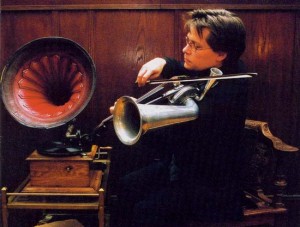 When I was 18, I bought a record called The New Music. It featured Kontra-Punkte by Karlheinz Stockhausen and Threnody for the Victims of Hiroshima by Krzysztof Penderecki. I was incredibly proud of myself for giving this music a try, even though the Stockhausen sounded like a cat running up and down the piano, and the Penderecki was that reliable old post-Schoenberg standby: belligerent bees buzzing in the basement. I did not really like these pieces, but I would put them on the turntable every few months to see if the bizarre might one day morph into the familiar. I’ve been doing that for 40 years now, and both compositions continue to sound harsh, unpleasant, gloomy, post-nuclear. It is not the composers’ fault that they wrote uncompromising music that was a direct response to the violence and stupidity of the 20th century; but it is not my fault that I would rather listen to Bach. That’s my way of responding to the violence and stupidity of the 20th century, and the 21st century as well. Read the whole article here.
When I was 18, I bought a record called The New Music. It featured Kontra-Punkte by Karlheinz Stockhausen and Threnody for the Victims of Hiroshima by Krzysztof Penderecki. I was incredibly proud of myself for giving this music a try, even though the Stockhausen sounded like a cat running up and down the piano, and the Penderecki was that reliable old post-Schoenberg standby: belligerent bees buzzing in the basement. I did not really like these pieces, but I would put them on the turntable every few months to see if the bizarre might one day morph into the familiar. I’ve been doing that for 40 years now, and both compositions continue to sound harsh, unpleasant, gloomy, post-nuclear. It is not the composers’ fault that they wrote uncompromising music that was a direct response to the violence and stupidity of the 20th century; but it is not my fault that I would rather listen to Bach. That’s my way of responding to the violence and stupidity of the 20th century, and the 21st century as well. Read the whole article here.
Tom Service responds:
Lord. To read Joe Queenan on new classical music, you might as well think that we really ought to give up the whole shooting match as a waste of time; that what composers have been up to for the last 100 years or so amounts to nothing more an act of monumental hubris, an attempt by a century’s-worth of composer despots to convince audiences, against their will, that their atonal awfulness and, as he puts it on Birtwistle, “funereal caterwauling” were essential to the survival of the art form. If he’s on the money when he says that there are no audiences for this music and that the project of modern or modernist music is now, and always has been, a busted flush, then, to use a phrase I seem to remember from his review of Birtwistle’s The Minotaur on Newsnight Review, the whole thing has been culture’s most outrageous “con trick”. It would be if he was right. Read the full response here.
New York composer and critic Daniel Felsenfeld also issued his own broadside against Queenan on his blog, FelsenMusick. Click here to read it.



No Comments